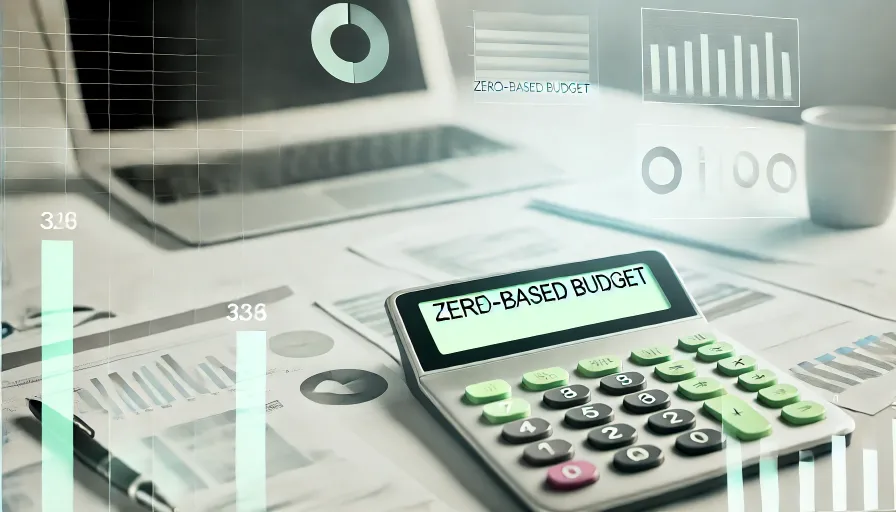Zero-Based Budget Calculator
Zero based budgeting is a financial planning method that requires you to justify every expense for each new period. Unlike traditional budgeting, where past expenditures guide future budgets, zero-based budgeting starts from a "zero base," and every function within an organization or household is analyzed for its needs and costs. This method helps in controlling expenses, increasing savings, and reducing financial waste.
A zero-based budget calculator is a digital tool that assists in creating a zero-based budget by allowing users to input their income and expenses, justifying each expense, and ensuring all funds are allocated appropriately.
What is Zero-Based Budgeting?
Zero-based budgeting (ZBB) is a budgeting method where every expense must be justified for each new budget period. It starts from a zero base, with all expenses needing approval, rather than simply adjusting the previous period's budget. This approach encourages more careful spending and helps identify unnecessary expenditures.
Importance of Zero-Based Budgeting
Zero-based budgeting is crucial for both individuals and organizations because it provides a disciplined approach to managing finances. It helps ensure that every dollar is allocated effectively, promoting financial responsibility and encouraging the identification of cost-saving opportunities.
The Concept of Zero-Based Budgeting
Understanding the concept of zero-based budgeting is essential for successful implementation.
Definition
Zero-based budgeting is a method of budgeting in which all expenses must be justified for each new period. This means starting from zero and considering every cost's necessity and value before including it in the budget.
Key Principles
The key principles of zero-based budgeting include:
- Justification: Every expense must be justified and deemed necessary.
- Prioritization: Prioritizing spending based on necessity and value.
- Efficiency: Encouraging efficient use of resources by scrutinizing all expenditures.
- Flexibility: Allowing for adjustments and changes based on current financial realities.
Introduction to Zero-Based Budget Calculators
Zero-based budget calculators are tools designed to help users implement zero-based budgeting efficiently.
Definition
A zero-based budget calculator is a digital tool that assists in creating a zero-based budget by allowing users to input their income and expenses, justifying each expense, and ensuring all funds are allocated appropriately.
Purpose
The purpose of a zero-based budget calculator is to simplify the budgeting process, making it easier to justify expenses and manage finances effectively.
Advantages
- Efficiency: Streamlines the budgeting process.
- Accuracy: Ensures all expenses are accounted for.
- Convenience: Allows for easy adjustments and updates.
Features of an Effective Zero-Based Budget Calculator
An effective zero-based budget calculator should have several key features to ensure it meets users' needs.
User-Friendly Interface
A user-friendly interface is crucial for making the calculator easy to use and navigate, ensuring users can quickly input and analyze their data.
Customization
Customization options allow users to tailor the calculator to their specific needs, ensuring it can accommodate various income sources and expense categories.
Security
Security features are essential to protect users' financial information and ensure their data is kept confidential.
How to Use a Zero-Based Budget Calculator
Using a zero-based budget calculator involves setting up the tool, inputting data, and analyzing results to create an effective budget.
Setting Up
Begin by setting up the calculator, entering your financial goals, and customizing categories to fit your needs.
Inputting Data
Input all sources of income and categorize each expense, justifying its necessity and aligning it with your financial goals.
Analyzing Results
Analyze the results to ensure all funds are allocated appropriately and make adjustments as necessary to optimize your budget.
Top Zero Based Budget Calculators
Several top zero-based budget calculators are available, each offering unique features and benefits.
Reviews
Review the top calculators to understand their features, ease of use, and overall effectiveness.
Comparisons
Compare different calculators to find the one that best meets your needs, considering factors such as customization options and user interface.
Pricing
Consider the pricing of each calculator to ensure it fits within your budget, looking for tools that offer the best value for their features.
Case Study: Successful Zero Based Budgeting
A real-life example of successful zero-based budgeting can provide valuable insights and lessons.
Real-Life Example
Consider a case study of a household or organization that successfully implemented zero-based budgeting, detailing their process and outcomes.
Lessons Learned
Identify key lessons learned from the case study, including best practices and common pitfalls to avoid.
Common Mistakes to Avoid
Avoiding common mistakes can help ensure the success of zero-based budgeting.
Overcomplicating
Keep the budgeting process simple and straightforward to avoid becoming overwhelmed.
Ignoring Small Expenses
Ensure all expenses, no matter how small, are accounted for and justified to prevent budget discrepancies.
Inconsistent Tracking
Regularly track and review expenses to maintain an accurate and effective budget.
Tips for Effective Budgeting
Effective budgeting requires regular reviews, adjustments, and accountability.
Regular Reviews
Conduct regular reviews of your budget to ensure it remains accurate and aligned with your financial goals.
Adjustments
Be prepared to make adjustments as circumstances change, ensuring your budget remains relevant and effective.
Accountability
Hold yourself accountable for sticking to the budget, involving others if necessary to maintain discipline.
Zero-Based Budgeting for Individuals
Zero-based budgeting can be particularly beneficial for individuals managing personal finances.
Personal Finance
Implement zero-based budgeting in your personal finances to gain better control over your spending and savings.
Household Budgeting
Apply zero-based budgeting to household finances to ensure all expenses are justified and prioritized appropriately.
Zero-Based Budgeting for Businesses
Businesses can also benefit significantly from zero-based budgeting, improving financial efficiency and control.
Corporate Finance
Implement zero-based budgeting in corporate finance to optimize resource allocation and reduce unnecessary expenditures.
Departmental Budgets
Apply zero-based budgeting to departmental budgets to ensure each department operates efficiently and within its means.
Zero-Based Budgeting vs. Traditional Budgeting
Understanding the differences between zero-based and traditional budgeting can help determine the best approach for your needs.
Differences
Zero-based budgeting starts from zero, requiring justification for every expense, while traditional budgeting adjusts previous budgets.
Pros and Cons
Consider the pros and cons of each method to decide which is most suitable for your financial goals and circumstances.
Future Trends in Zero-Based Budgeting
Stay informed about future trends in zero-based budgeting to remain ahead of the curve.
Automation
Automation tools can simplify the zero-based budgeting process, making it more efficient and less time-consuming.
AI Integration
AI integration can enhance budgeting accuracy and provide predictive analytics to optimize financial planning.
Predictive Analytics
Predictive analytics can help forecast future expenses and income, allowing for more informed budgeting decisions.
Frequently Asked Questions
How does zero-based budgeting differ from traditional budgeting? Zero-based budgeting requires justification for every expense, starting from zero, while traditional budgeting adjusts previous budgets.
What are the main benefits of zero-based budgeting? Zero-based budgeting provides financial control, increased savings, and reduced waste by ensuring every expense is justified.
Can zero-based budgeting be used for both personal and business finances? Yes, zero-based budgeting is effective for both personal and business finances, helping to manage resources efficiently.
What tools are available for zero-based budgeting? Tools for zero-based budgeting include spreadsheets, mobile apps, and online calculators that simplify the process.
How often should I review my zero-based budget? Regular reviews, ideally monthly or quarterly, are recommended to ensure the budget remains accurate and effective.
What are common mistakes to avoid in zero-based budgeting? Common mistakes include overcomplicating the process, ignoring small expenses, and inconsistent tracking.
Conclusion
Zero-based budgeting is a powerful method for gaining financial control and ensuring every expense is justified and necessary. By understanding the principles, benefits, and challenges of zero-based budgeting, and utilizing tools like zero-based budget calculators, individuals and organizations can optimize their finances and achieve their financial goals.



